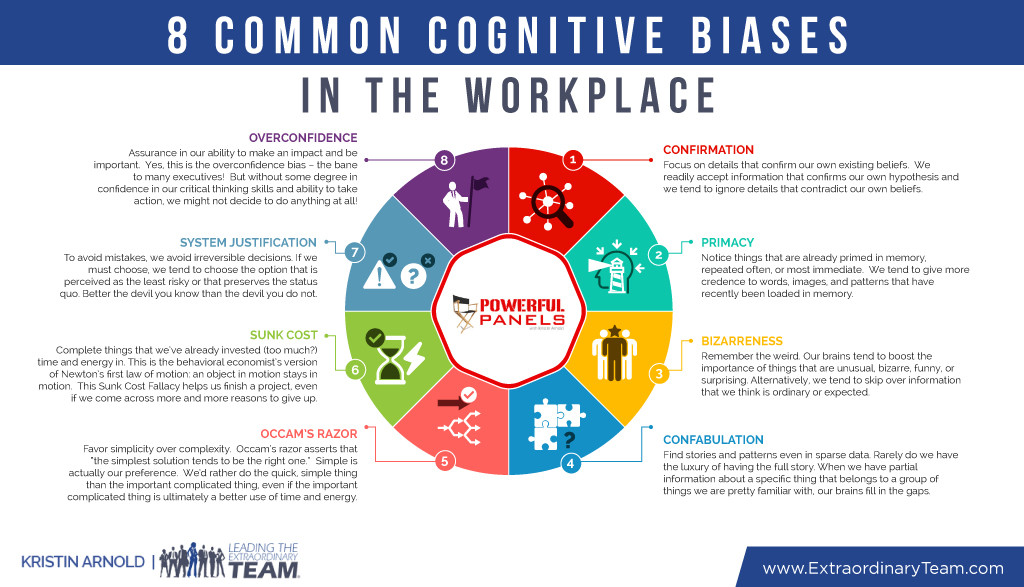
8 of the Most Common Biases in the Workplace
Once you have addressed the problem, it’s time to move into the analysis phase. Now this is the tricky part where our cognitive biases influence our thinking. Wikipedia, otherwise known as the font of all knowledge, lists 175 biases – which is far too many to discuss in this article – but keep in mind that they all play into our perceptions and realities. There’s no escaping them. However, you can gain awareness of them and how they impact your thinking, and then take countermeasures to become less influenced by these biases.
Because there is so much information out there in the universe, our brains are wired to make sense of it all. Below are the eight most common cognitive biases I see in the workplace:
- Confirmation. Focus on details that confirm our own existing beliefs. We readily accept information that confirms your own hypothesis and we tend to ignore details that contradict our own beliefs. (Note to reader: this is my biggest bias!)
- Primacy. Notice things that are already primed in memory, repeated often, or most immediate. We tend to give more credence to words, images, and patterns that have recently been loaded in memory.
- Bizarreness. Remember the weird. Our brains tend to boost the importance of things that are unusual, bizarre, funny, or surprising. Alternatively, we tend to skip over information that we think is ordinary or expected.
- Confabulation. Find stories and patterns even in sparse data. Rarely do we have the luxury of having the full story. When we have partial information about a specific thing that belongs to a group of things we are pretty familiar with, our brain fills in the gaps with a SWAG (Silly Wild Arse Guess) or SWAG-NER (Silly Wild Arse Guess Not Easily Refuted!)
- Occam’s Razor. Favor simplicity over complexity. Occam’s razor asserts that the simplest solution tends to be the right one. Simple is actually our preference. We’d rather do the quick, simple thing than the important complicated thing, even if the important complicated thing is ultimately a better use of time and energy.
- Sunk Cost. Complete things that we’ve already invested (too much?) time and energy in. This is the behavioral economist’s version of Newton’s first law of motion: an object in motion stays in motion. This Sunk Cost Fallacy helps us finish a project, even if we come across more and more reasons to give up.
- System Justification. To avoid mistakes, we avoid irreversible decisions. If we must choose, we tend to choose the option that is perceived as the least risky or that preserves the status quo. Better the devil you know than the devil you do not.
- Overconfidence. Be confident in our ability to make an impact and be important. Yes, this is the overconfidence bias – the bane to many executives! But without some degree in confidence in our critical thinking skills and ability to take action, we might not decide to do anything at all!
Before you throw up your hands and admit defeat, you have the ability to recognize these biases in your own thinking as well as on your team. The key is to call it out. Share why you think that bias is affecting the team’s decision. Look for and consider alternative viewpoints before you rush full steam ahead, presenting that rock to the CEO.
Thanks to Buster Benson for his contribution to this list!
KRISTIN ARNOLD, MBA, CPF, CSP is a high-stakes meeting facilitator and professional panel moderator. She’s been facilitating teams of executives and managers in making better decisions and achieving greater results for over 20 years. She is the author of the award-winning book, Boring to Bravo: Proven Presentation Techniques to Engage, Involve and Inspire Audiences to Action.
Recent Articles:
4 Tell-tale Signs You are a Controlling Leader
Leaders: Do You Need Strategic Planning or Do You Have Clear Vision?
Stretch your Leadership Team’s Ability to Think Strategically

Chief & Senior Executive Networks are the premier industry-specific peer group organizations serving North America.
4yTrying to hold these biases in mind while operating at full speed is really challenging. Perhaps a good operating principle is "I don't know what I don't know." This can lead to a person to be more open to unconscious influences. What do you think?